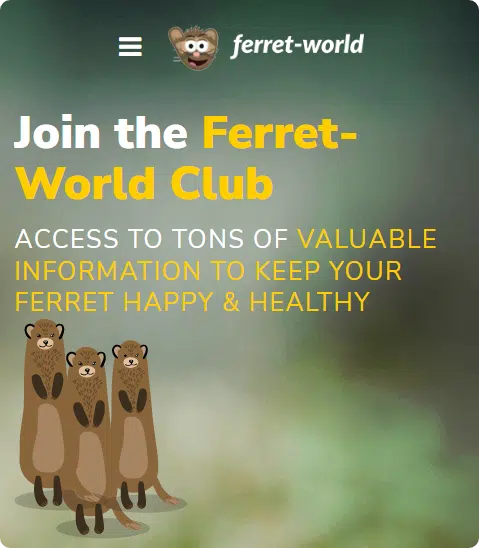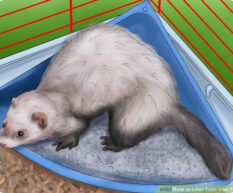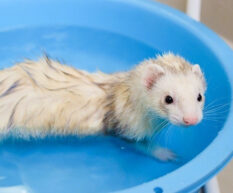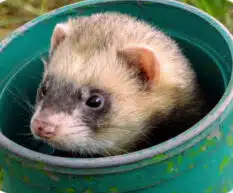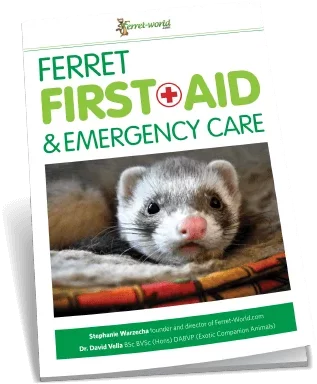Ferret News
The Business of Ferrets in Croatia: An Interview with Petra Logožar
By Stephanie Warzecha
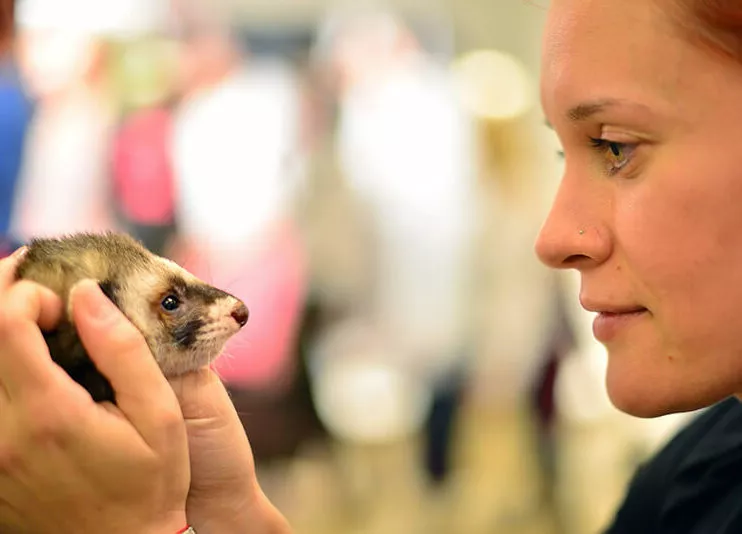
Last year, I was in Croatia and it didn’t even cross my mind that there might be ferret owners over there. But low and behold, a few months later I met Petra Logožar on Facebook and we got along swimmingly. She is such an awesome woman, and I really admire her determination to help ferrets in her country. Petra founded the first ferret association, Tvorum, in Croatia and estimates that there are about 1,000 ferrets in the country thus far. With a steady growth in popularity of these wonderful creatures, in this interview, she tells us how she got into ferrets, the challenges her association faces, the legislation her association is trying to get through government to help protect ferrets, and the strict adoption process she has for people who want to adopt ferrets. It’s a very insightful and interesting interview!
1. How long have you been a ferret owner? How did you get started on the journey of ferret ownership?
Whenever somebody asks me why I chose ferrets as my life companions, I always answer with: “They chose me. Jura and Jurica are the ones to blame.”
During a hot summer day in June of 2003, my boyfriend and I were taking a lazy afternoon stroll that led us into a local pet shop. We did not have a pet at that time. You see, back then, we lived in a small condo, were struggling with our finances from month to month. A pet wasn’t exactly something we needed or wanted back then. I just graduated from college. I managed to land a job at the Faculty of Political Sciences library, but I was also looking for a steadier job with my freshly baked Master of Science degree in political sciences at the same time.
In the pet store, we expected to find parrots, hamsters, bunnies, you know, regular pets that were sold in pet stores at that time. As soon as we entered, BANG!, my heart stopped. There they were: two stunning creatures. Black and white, yin and yang, curled exactly in that pose, and as I later learned, one of their favourite sleeping poses, just peacefully breathing with front paws wrapped around each other.
It was love at first sight. I was mesmerized, I couldn’t peel my eyes off of them. I sat on the floor in front of a terrarium where they were placed and was completely awestruck.
I didn’t know what they were. I have never seen ferrets before. Even though I grew up surrounded by animals, as my grandparents and parents had cats, dogs, chicken, pigs, I had never come across anything like them. Although I liked and knew my way around animals, never had I been so utterly fascinated and spellbound.
The pet store clerk asked me if I would like to pet them. Of course I did. He put on his heavy leather gloves, grabbed the white one and, holding him in a tight grip, the clerk told me to pet his little furry back but watch for the teeth. While the furball was waking up, yawning and exposing the impressive canines under the most pink and lovely nose I’ve ever seen, I fell in love.
We exited the pet store with both of them, an albino brother and a sable sister, tucked in a cardboard box, along with a medium sized cage, a pack of hay, a pack of kibble, one tube of treat paste, and a water bottle.
We didn’t even own a car back then, so we stormed into public transport and took them home. They smelled and they wanted to dig through the box. People were staring at us and making room for us on the bus. I didn’t care, I just wanted to come home and let the little beasts out to play. We named male Jura and female Jurica. As soon as we let them out, they ran through our apartment like two little hurricanes, wreaking havoc all over the place. We soon learned that there was a reason the pet store clerk had gloves while he handled them: they both made sure our feet would be bloody and bitten in a matter of minutes. It was more than 30 ℃ degrees in the flat (86 ℉), we had no AC unit, the ferrets were crazy and constantly out playing and making a mess while our swollen and bitten feet were being cooked in thick winter socks and tennis shoes.
We had no idea what we got ourselves into. We searched the internet night and day. During the first few days, we learned that ferrets bite, that hay is a very bad idea to have for their bedding, especially when you have no AC unit and summer is at its peak.
We also found out that we had to vaccinate the little buggers, and we had to neuter them, too. This is also something the shop clerk forgot to mention. During a year with those two little critters (no worries, I know they are NOT critters, but we love to call them that), I realized they fascinate and surprise me with something new every single day.
After a year, we got another ferret named Bony. Then soon another that, we got another one, Moogie. Then, surprise, we got another one, called Baltazar. We also met several other people who were ferret owners. Amongst those rare ferret owners, a couple decided to give up their ferret in 2005. This was the first time that we decided to adopt a ferret. I could probably write a biography revolving only around ferrets, but I will only mention their names and keep memories for myself. By the order in which they came into my life, they go as follows: Jura and Jurica, Bony, Moogie, Baltazar, Valkyra, Vamp, Lilith Bella, Ram and Kiara, Zillah, Pyro, Zhou, Anael, Rhea. All of them have passed away by now The current squad is Sigmund and Signy, Hogar, Hurittt, Ayasha, Ernest, Zina and Oona. So, I’ve been struck by ferret math. Really heavily.
Oh and we also have three cats now too! Enoch, Sokkinn, and Calista.
2. What role do you play in ferret welfare in Croatia? How long have you been doing this work?
My fascination with ferrets pushed me to learn, invest into my education, buy expert literature, and connect with people who I can learn from. Honestly, I cannot put my finger on the exact timing my love for ferrets grew into care for their welfare and well-being in Croatia in general.
By the end of 2003, the first year ferrets came into my life, I joined a forum named Ferrets of Croatia. Interestingly, the founder and admin of this forum was a very sweet girl from the USA named Tesha, who got her first ferret, Kiss, around same time Jura and Jurica became my first ferrets.
A few of us gathered on this forum, helped each other, exchanged information and soon, as the number of pet ferrets increased in Croatia, word about us came out. We made strong connections. Some of us are still friends after all these years, helping each other through good and bad times. After a few years of postponing the idea to institutionalize as a formal association due to business and private issues, in 2010, I finally decided the time is right to establish a ferret association in Croatia. Together with two of my friends, Marina and Davorka, I founded the first and only Croatian ferret enthusiasts’ association under the name of Tvorum (a play on words–tvor being a popular Croatian name for a ferret and the forum that was a place we all grew from).
I’m in my second mandate now, each term lasting for four years. My initial idea was to increase awareness of ferrets and their needs as pets (physical, medical, nutritional, psychological) to educate owners, the general public, and veterinary practitioners in Croatia. In the years before founding Tvorum, while we did our best through the forum and gatherings organized through it, the number of unwanted ferrets slowly increased. Naturally, as many people unadvisedly got ferrets but couldn’t deal with them, there were many ferrets who were abandoned, neglected, even abused, and their numbers increased steadily. I realized we have to deal with this issue, too.
3. What inspired you to educate people on ferrets in your country? How many people do you have helping you?
First of all, the importance of ferrets having excellent quality of life and enrichment, being happy and content and reaching their full potential as companion animals pushed me to enforce the message that an informed owner is a good owner.
Secondly, the inadequate education regarding ferrets that many aspiring veterinary practitioners get at the Croatian Vet University was also the reason for constantly and consistently stressing the importance of educated owners as people who push their practitioners to invest in their knowledge and nurture constant professional curiosity and interest in ferrets as patients.
Currently, Tvorum’s backbone consists of less than 15 active volunteers in various parts of Croatia who help with all of it, from organizing educational workshops to being temporary foster care for ferrets we take in.
At one point, my partner Aleksandar and I had more ferrets we took in than our own. As time went by, those we took became our ferrets as well, some of them due to the fact they weren’t “adoptable” because of health issues they had, and all of them due to the fact that as soon as they crossed our doorstep, they held our hearts hostage.
This is how we ended up having 14 ferrets, with both of us working full-time jobs with constant overtimes. Back then I took on an additional job as PR freelancer in order for us to be able to finance all of their needs.
All of our Tvorum volunteers are strung between their own ferrets, jobs, families, lives, and taking care of the association’s ferrets while constantly helping us to do as much as we can for the ever-growing ferret population in Croatia, especially those in need.
There are no words big enough, there is no description of an emotion I feel towards them for doing such noble work–I am grateful, I am humbled, I am proud of each and every one of them. They will recognize themselves; it would be unfair to name some and not all. All those women and men know who they are and hopefully they know how grateful I am. Without them, Tvorum wouldn’t exist.
4. How many ferrets are there in Croatia? Are they becoming more popular as pets?
During past few years, the number of ferrets as pets increased dramatically, reaching their peak some three to four years ago. According to our recent statistics, there are about 1,000 ferrets in Croatia now. Right now, the interest for them as companion animals is a bit lower, but this is usual during summer season because of the vacation and time off. Most people contact us during winter and spring.
5. What is the standard of medical care for ferrets in Croatia? Do you have experienced ferret vets? Or do you need to travel to other countries to get the best care?
Truth be told, there is no standard, and everything can be considered standard. It is definitely better than it was before, and many practitioners have worked on their education, but there are less than five recommended vets in all of Croatia–two in our capital of Zagreb, one in Split, remaining two scattered. But this “recommended” adjective has to be taken into consideration with a healthy dose of scepticism since most of them know only the basics and basic procedures. Two of them are extremely skilled in diagnostics.
Some owners travel to neighbouring Slovenia to Ljubljana – their vet university has a brilliant ferret expert, Dr. Jožko Račnik. Some even go as far as Vienna, Austria. Some pray to God, seek a higher power, ask for free advice which we can offer only as educated owners. No one in our association is a vet, and we simply cannot help when it comes to complicated health issues. We can advise owners where to seek help, but it’s up to them to actually go seek help.
6. What knowledge do you find is most lacking amongst ferret owners in Croatia?
Two things instantly pop into my mind: feeding properly and regular vet check-ups. For the last few years, Tvorum has been strongly pushing the message of a balanced raw diet as the only proper diet for these strict carnivores we have as our pets.
We are investing a huge amount of energy and time into educating owners and even vets (who are mostly reluctant, suspicious, uncooperative and well, the usual) regarding the need to offer ferrets proper raw diet with a balanced ratio between meat, bone, and organs.
Our vice-president, Natalija Žanetić Car, finished a mentoring program at Holistic Ferret Forum and does a great job in educating Croatian owners. During the last year, Tvorum did a series of workshops offering owners advice on transitioning to a raw balanced diet with tips and tricks which would make transition smoother both for the owner and their ferrets, who can be stubborn little rascals, needless to say.
7. What is the ferret community like in Croatia?
People are well-connected, helpful, and supportive of the association’s work. They are prepared to offer advice, help, and transport–whatever they can, when they can. Some of us go way back to the very beginning of organised ferret owners’ meetings gathered around the forum; many strings and threads are interlacing us, although life took us to various places. Once, after being a guest, presenting ferrets and Tvorum on his TV show, a journalist told me that ferret owners are fanatics and a sect. I took it as a compliment.
8. Where do people get ferrets in Croatia? Do you have a problem with bad breeders? Do they come from pet shops? Or do people travel to other countries to adopt ferrets and buy from reputable breeders?
Tvorum has pushed a huge amount of energy and time into educating people not to buy ferrets from pet stores due to inadequate conditions they have there, and they are also advised not to buy them from backyard breeders who have both horrible conditions and complete lack of care about genetics. We only recommend informed purchases at registered breeders who are controlling genealogy or adopting them through our association.
There was only one recommended breeder in Croatia, Ferret Hill Kennel, who satisfied all standards, but it is closed now due to private reasons. In neighboring countries, there is a recommended breeder in Slovenia, All about Ferrets, and another one in Hungary, Nostrofuretti Kennel.
Even though we recommend such purchases and adoptions, we still experience a more or less constant arrival of ferrets for adoption to Tvorum.
Should you ask someone privately, people would generally describe our process of adoption as time-consuming and strenuous. Adopters have to meet strict and rigid conditions. In addition to this, there is a mandatory contract, adoption fee, and subjection to criminal prosecution in the case of breaching the contract’s terms.
Luckily, as ferrets’ popularity is somewhat constant now, we are not being flooded with unwanted ferrets, so we are lucky to be able to have such an adoption process. We don’t get rid of them as soon as there is an interested person. We make sure to secure them a forever loving home with people who are prepared to go through our tiring adoption process for them–because those are exactly the people who would most probably go through hell and back for them if needed.
9. What do Croatian ferret owners do differently compared to owners around the world?
Each country has their own specifics regarding ferret owners and keeping ferrets. To me personally, it seems that ferret owners in Croatia are more aware of the carnivorous and true nature of their pets. Ferrets are not spayed and neutered at such an early age. Tvorum constantly promotes the message of prolonging the period of being whole to at least nine months or more of age in order to prevent early onset (or onset as such) of adrenal disease.
10. Do you have ferret shows in Croatia? What other events do you have?
This is a question I am continuously asked, but my answer is still no, we don’t. We have educational events, workshops, and lectures; these events also involve time for socializing both ferrets and owners. Tvorum volunteers run donation events called Baltazarov Donacijski Plac, which offers organised ferret sitting for ones who need it. Our projects raise funds which keep Tvorum working. All of our time and hours are volunteered. No one gets a Kuna for it. (Did you know that Croatian money is called Kuna and kuna means pine marten, our ferrets’ wild cousin?)
11. Do you travel to other ferret shows and events around Europe?
We nurture excellent relations with the ferret association Zverinice in neighbouring Slovenia, and I travel there because it is only an hour and a half drive. Having three cats and eight ferrets of our own (and one of the ferrets, Ernest, with a spinal injury, whose bladder has to be expressed manually four times a day), running a media analysis agency with my partner, baking sweets, riding long bicycle routes, and exercising daily doesn’t really leave me much time for long-distance travel.
12. What have been the biggest challenges with the project you run?
Lack of funds and lack of time. No state- or county-based options or projects to get financial support. Animal protection legislation is still in process. Some things are better, but there is still enormous space for improvements. The animal protection law has finally passed governmental procedure and is in Parliament procedure. There is a strong possibility that the issue we forcefully pushed for many years will pass: a ban on selling ferrets in pet stores.
In Croatia, cats and dogs cannot be sold in pet stores, and we pushed the message of equalizing ferrets with both of those companion pets in that part of the regulation. Autumn Parliament session will show whether we finally managed to make that step. One small step for mankind but a huge one for Croatian ferrets. At the moment, our members of Parliament are enjoying their summer vacation, which lasts for two months, and we are waiting impatiently for the session which will have the animal protection law on the agenda.
13. What are the biggest challenges ferret owners experience in Croatia?
Finding a skilled vet and financing their ferrets’ medical needs when the time comes. You don’t have a regular pet, and you need more than a regular vet. One has to light the fire of inquisitiveness for the vet, for his own knowledge, for the past and future of the ferret as a life companion.
14. Is there anything else you would like to tell us about what you do?
Someone once told me that the price of compassion comes in blood and tears, but if I had to do it all over again, I would do it just like it was done so far–and I swear, I would try to do even more.
Years of constant stress, lack of sleep, extreme emotional involvement and absence of care for myself have resulted in health issues that I mostly ignored and were finally diagnosed as an autoimmune disease last year when I ended up in the hospital. I am not sorry, I am not bitter, and I would do it all over again–even more and even better.
Usually, people see me as strong and direct, but in years I realized this is the only way to achieve what I and all the other volunteers have achieved. We don’t sugar-coat and we take off everyone’s pink glasses. We will only continue to do so.
I will speak about ferrets and for ferrets until my last breath. As my first ferret t-shirt I bought from an overpriced US web shop in 2003 said, “Love me–love my ferret.” Translated to my gestalt: if you don’t love my ferret, you don’t exist for me. Plain and simple.
